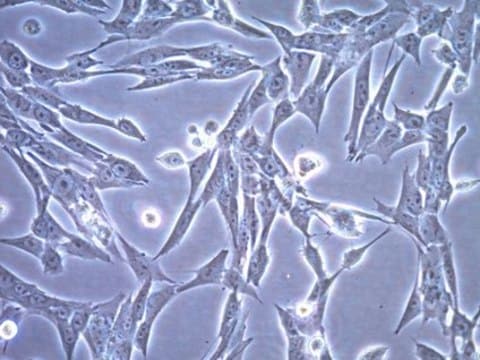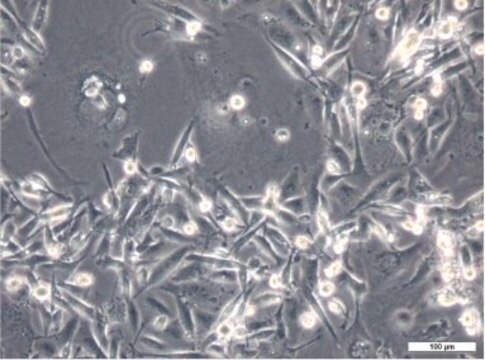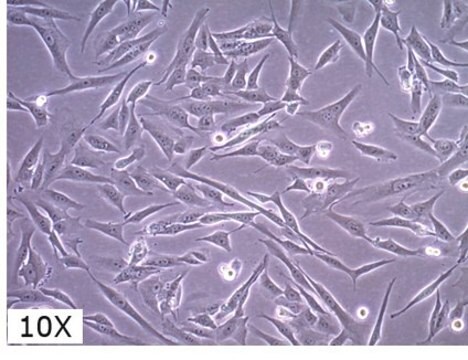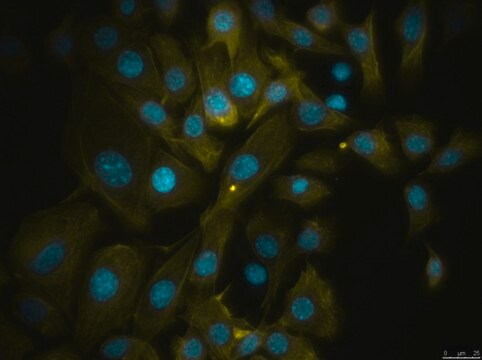Empfohlene Produkte
Biologische Quelle
human blood
Wachstumsmodus
Suspension
Karyotyp
Not specified
Morphologie
Lymphoblastoid
Produkte
Not specified
Rezeptoren
Not specified
Methode(n)
cell culture | mammalian: suitable
Relevante Krankheit(en)
cancer
Versandbedingung
dry ice
Lagertemp.
−196°C
Verwandte Kategorien
Ursprung der Zelllinie
Human acute myeloblastic leukaemia
Beschreibung der Zelllinie
ML-1 is one of three celll lines isolated in 1978 from the peripheral blood of a 24 year old male patient with acute myeloblastic leukaemia. The cells can convert to more mature cells by the use of DMSO. The Y chromosome could not be detected in this cell line by short tandem repeat (STR)-PCR analysis when tested at ECACC. It is a known phenomenon that due to the increased genetic instability of cancer cell lines the Y chromosome can be rearranged or lost resulting in lack of detection. The cell line is identical to the source provided by the depositor based on the STR-PCR analysis.
Anwendung
ML-1 has been used to compare the cell response to mafosfamide cyclohexylamine salt, 4-hydro-peroxy-cyclophosphamide and β-D-glucose-isophosphoramide mustard, which are oxazaphosphorine agents.
DNA-Profil
STR-PCR Data: Amelogenin: X
CSF1PO: 10,11
D13S317: 9,12
D16S539: 9,12
D5S818: 12
D7S820: 9,11
THO1: 7,9.3
TPOX: 8,10
vWA: 16
CSF1PO: 10,11
D13S317: 9,12
D16S539: 9,12
D5S818: 12
D7S820: 9,11
THO1: 7,9.3
TPOX: 8,10
vWA: 16
Nährmedium
Subkultur-Routine
Maintain cultures between 2-9 x100,000 cells/ml; 5% CO2; 37°C. Freeze in 10% DMSO + 90% FBS. Immediately after resuscitation, pellet cells by centrifugation at 150 x g for 5 minutes and resuspend the cell pellet in fresh medium. This is to remove the presence of DMSO which may cause differentiation of the cells if allowed to remain.
Sonstige Hinweise
Additional freight & handling charges may be applicable for Asia-Pacific shipments. Please check with your local Customer Service representative for more information.
Analysenzertifikate (COA)
Suchen Sie nach Analysenzertifikate (COA), indem Sie die Lot-/Chargennummer des Produkts eingeben. Lot- und Chargennummern sind auf dem Produktetikett hinter den Wörtern ‘Lot’ oder ‘Batch’ (Lot oder Charge) zu finden.
Besitzen Sie dieses Produkt bereits?
In der Dokumentenbibliothek finden Sie die Dokumentation zu den Produkten, die Sie kürzlich erworben haben.
Unser Team von Wissenschaftlern verfügt über Erfahrung in allen Forschungsbereichen einschließlich Life Science, Materialwissenschaften, chemischer Synthese, Chromatographie, Analytik und vielen mehr..
Setzen Sie sich mit dem technischen Dienst in Verbindung.





